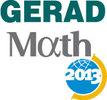HEC Montréal, Canada, 6 - 8 mai 2013
Journées de l'optimisation 2013
HEC Montréal, Canada, 6 — 8 mai 2013

MA11 Applications en foresterie / Applications in Forestry
6 mai 2013 10h30 – 12h10
Salle: Gérard Parizeau
Présidée par Bernard Gendron
4 présentations
-
 10h30 - 10h55
10h30 - 10h55A Transportation-Based Formulation for Annual Harvest Planning
Due to the importance of maximizing driver satisfaction when doing annual planning, the harvest sequencing of the forest units has been identified as more flexible in order to satisfy driver schedules. We derive a mixed integer formulation for this problem, and a branch-and-price based heuristic that quickly generates feasible solutions.
-
 10h55 - 11h20
10h55 - 11h20A Column Generation Approach for Demand-Driven Harvest Scheduling
We present a solution method based on column generation, to plan annual harvest activities driven by mills demands, integrating transportation and inventory management. The problem is separated in two parts: creating meaningful harvest schedules and choosing appropriate ones to induce a satisfying harvest production at minimum cost.
Computational results are on actual large-scale instances from the context of the Eastern Canadian forest. -
 11h20 - 11h45
11h20 - 11h45Real-Time Transportation and Logistics Systems Planning and Control
This project aims at developing methods for choosing, in real time, alternative itineraries for trucks transporting wood from forest areas to plants that face unforeseen events revealed while performing the trip. Currently, we draw up a list of unforeseen events and of possible recourse actions for each event.
-
 11h45 - 12h10
11h45 - 12h10Solving and Integrated Multi-Period Wood Procurement Problem
The problem we consider is a practical multiple period wood procurement planning problem from the perspective of Eastern Canadian context. Within this context, forest cut blocks are large, heterogeneous and have different densities, and diameter class of trees. The total planning horizon considered is one year, divided into 12 time periods (months).
This forest management problem is difficult to solve since it integrates two inter-related problems: the forest bucking problem using a cut-to-length (CTL) bucking system and the multi-facility supply planning problem. In fact, the choice of areas to harvest in each period and how to harvest it, affects the amount of different assortments provided to mills. The main decisions deal with which areas to harvest during each period so that orders from various wood-processing facilities, located in distant places are satisfied. Moreover, the model provides decision support with respect to how to harvest the different cut blocks according to the bucking priority list used, and in what quantities harvested logs from each block should be transported to sawmill. Also, the model was used to compare the current planning procedure to a new planning one. The new strategy presents a centralized inventory management policy.
In this paper, we extend the procurement model presented in DEMS et al. (2013) in order to consider a more detailed multiple period planning. We develop a mixed integer linear model describing the problem (MIP). Computational results from an Eastern Canadian forest company are presented.

